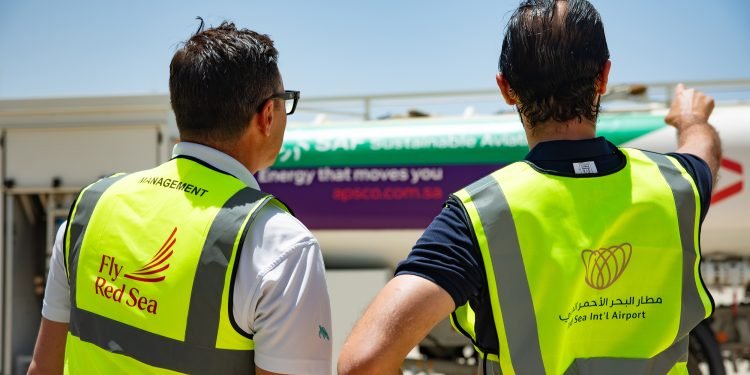By Eva Richardson – The Logistic News
February 26, 2025 – Red Sea Global (RSG), the developer behind Saudi Arabia’s regenerative tourism destinations, The Red Sea and AMAALA, has announced a landmark agreement to introduce Sustainable Aviation Fuel (SAF) to the Kingdom for the first time.
As part of ongoing efforts to make aviation more sustainable, RSG and daa International, the operator of The Red Sea International Airport (RSI), have signed a deal with the airport’s fuel supplier, Arabian Petroleum Supply Company (APSCO). Airlines operating at RSI now have the option to refuel using SAF, a significant milestone in reducing aviation-related carbon emissions.
Sustainable Aviation Fuel: A Game Changer for Air Travel
SAF and Lower-Carbon Aviation Fuel (LCAF) are innovative fuels designed to reduce the greenhouse gas emissions associated with aviation. SAF can be produced using clean hydrogen, captured carbon dioxide, or renewable and waste-derived aviation fuels.
According to international aviation standards set by ICAO and IATA, SAF must be blended with traditional Jet A1 aviation fuel. At RSI, SAF will be supplied in a 35% SAF and 65% Jet A1 blend, cutting carbon emissions per aircraft by up to 35%.
A Step Toward a Sustainable Future
John Pagano, Group CEO of Red Sea Global, emphasized RSG’s commitment to sustainability, stating:
“Travel connects cultures, broadens horizons, and rejuvenates the mind, body, and soul. However, it has an environmental cost. Our mission is to transform the industry and lead it toward a sustainable, regenerative future. By bringing Sustainable Aviation Fuel into the Kingdom, we are significantly reducing our guests’ carbon footprint from the moment they arrive and beyond. More importantly, we are encouraging the aviation sector to make better environmental choices.”
As part of its net-zero ambitions, RSG’s subsidiary air operator, Fly Red Sea, which provides seaplane transfer, charter, and scenic tour services, will exclusively use SAF and LCAF to minimize its environmental impact.
Additional Carbon Reduction Initiatives
RSG is also implementing solar power solutions to further reduce emissions. More than 400MWp of solar panels have already been installed at The Red Sea, a measure expected to prevent up to 600,000 tCO2eq per year once fully operational. Additionally, the company is working toward increasing mangrove density by 50 million by 2030 through protection, restoration, and collaboration with the National Center for Vegetation Cover and other stakeholders.
Michael White, Chief Commercial Officer at RSI, highlighted the environmental significance of the initiative:
“Introducing sustainable aviation fuel at Red Sea International Airport is a major step in our commitment to environmental stewardship. This initiative not only reduces carbon emissions but also aligns with our mission to protect The Red Sea’s unique and fragile ecosystem.”
Future Expansion and Growth
The Red Sea welcomed its first guests in 2023, and five hotels are currently operational. RSI has been handling domestic flights since September 2023, with international routes commencing in April 2024, including a twice-weekly service between The Red Sea and Dubai International.
Upon full completion in 2030, The Red Sea will feature 50 luxury resorts, offering up to 8,000 hotel rooms and more than 1,000 residential properties across 22 islands and six inland locations. The development will also include marinas, golf courses, entertainment venues, fine dining, and leisure facilities.
With sustainability at its core, RSG’s initiatives set a new benchmark for aviation and tourism, making The Red Sea a global leader in eco-friendly travel and sustainable logistics.
For more updates on sustainable aviation and logistics innovations, stay connected with The Logistic News.
For media inquiries or to share insights, contact us at info@thelogisticnews.com.























